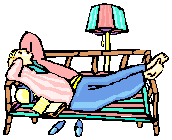 |
Student AreaSleep Disorders |
|
|
|
|
|
Sleep Apnea How long can you hold your breath? People with sleep apnea may stop breathing in their sleep for up to 2 minutes or more! (They usually breathe just fine when they are awake.) This happens over and over again at night, making them sleep poorly and feel very tired in the daytime. People with sleep apnea usually snore loudly.... Do you know anyone who snores? Sleep apnea can affect the heart, so it is a serious medical condition. It is usually treated with a special breathing mask worn during sleep. Delayed Sleep Phase Syndrome (DSPS) People with this disorder canít help staying up later and later each night, and waking up later and later each morning. They arenít just being "night owls" by choice; something is wrong with their internal body clocks, making it impossible for them to stay in sync with the rest of the world. This problem is most common among adolescents and young adults. The treatment usually consists of actually making the problem worse so it can finally get better. (The opposite problem, getting sleepier earlier and earlier in the day is called Advanced Sleep Phase Syndrome. It is most common among senior citizens.) Restless Legs Syndrome (RLS) Do your legs ever feel uncomfortable at night? Some people describe the feelings as "itchy" or "restless" or "like creepy-crawlies under my skin." People with RLS often get up and walk around at bedtime, because their legs "just wonít settle down" and it helps to move them. RLS is usually treated with medication. Insomnia How long does it take you to fall asleep? People with insomnia consistently take longer than 30 minutes to drift off to sleep. Insomnia is one of the most common sleep disorders, and it is sometimes hard to cure. Practicing good sleep hygiene may help. Sometimes the advice of a doctor or counselor is needed. Periodic Limb Movements in Sleep (PLMS) Imagine that you fell asleep one night while someone was holding your shin. Letís say after you fell asleep, that the person shook your leg every 20 seconds, for almost half the night! How do you think you would sleep? A sleep disorder called Periodic Limb Movements in Sleep (PLMS) is just like that, except that the personís own muscles are doing the shaking, rather than someone else doing it. It is usually treated with medication. Narcolepsy The symptoms of this rare disorder include extreme drowsiness, feeling weak at emotional times, and feeling paralyzed on the borders of sleep. Animals can have narcolepsy, too. Much of the research on narcolepsy has been done on dogs. And the "fainting goats" that are sometimes displayed at State Fairs actually have narcolepsy. In humans, narcolepsy is controlled with medication. REM Sleep Behavior Disorder (RSBD) Imagine what it would be like to act out your dreams, every night, while you were still sleeping! It would probably get you into some trouble, wouldnít it? People who have RSBD do act out their dreams, and to make matters worse, their dreams tend to be more violent and aggressive than other peoplesí dreams. So they often hurt themselves, or those around them. Luckily, RSBD is quite rare. There are many other kinds of sleep disorders, too: sleepwalking, night terrors, Jet Lag, Kleine-Levin Syndrome, bedwetting, head banging, night-time eating disorders, etc. If you have a question about sleep disorders, or think you might know someone who has one, talk to your family doctor or a sleep specialist at an accredited sleep lab. Here is a web site that lists accredited American labs by state: www.asda.org. (Click on "Sleep Disorders Centers and Labs" on the left-hand menu, and scroll down to the map or click on the state name below the map.) |
|
The information on this page is not intended to replace medical advice. If you have symptoms of a sleep disorder, please consult a sleep specialist or other doctor. Click the links below to go to other web sites to learn more about topics mentioned in this article: American Sleep Apnea Association Sleep Quest Home Page (includes sound of sleep apnea snoring)
|